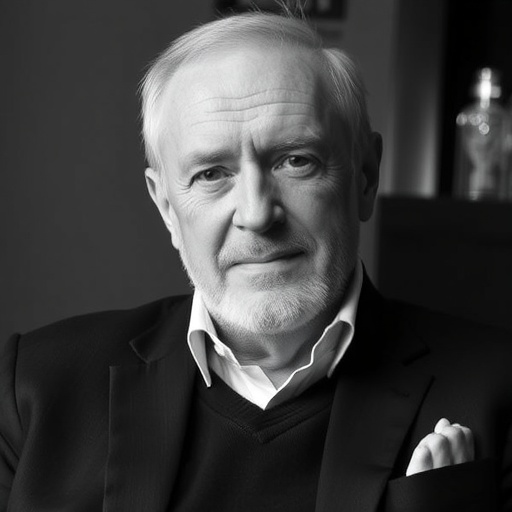Anthony Hopkins Marks 50 Years of Sobriety: The Pivotal Night That Saved Hollywood Legend from Alcohol’s Grip
In a candid revelation that has captivated fans and fellow Hollywood stars alike, Anthony Hopkins, the Oscar-winning actor renowned for his chilling portrayal of Hannibal Lecter, has opened up about reaching an extraordinary milestone: 50 years of sobriety. During a recent interview, the 86-year-old Welsh icon detailed the harrowing, life-altering moment in 1975 that propelled him to abandon alcohol forever, transforming his trajectory from self-destructive excess to enduring success in Hollywood. “I was a drunk, plain and simple,” Hopkins reflected, his voice steady yet laced with the weight of decades. This confession not only underscores his personal resilience but also shines a spotlight on the often-hidden battles with addiction that plague the entertainment industry.
Hopkins’ journey to sobriety began on a rain-soaked night in London, where a blackout episode behind the wheel nearly cost him everything. Waking up disoriented in his car, with no recollection of how he got there, the then-37-year-old actor confronted the abyss of his alcoholism head-on. “I thought, ‘This is it. I’m done,'” he shared in the interview, crediting that singular epiphany for his immediate decision to seek help through Alcoholics Anonymous (AA). Today, as he celebrates half a century without a drink, Hopkins’ story serves as a beacon for those grappling with similar demons, proving that redemption is possible even in the glittering yet treacherous world of Hollywood.
The actor’s milestone comes at a time when discussions around mental health and substance abuse in the film industry are gaining unprecedented traction. According to the National Institute on Alcohol Abuse and Alcoholism (NIAAA), alcohol use disorders affect over 28 million Americans annually, with creative professions like acting facing elevated risks due to high-stress environments and irregular schedules. Hopkins’ openness in this interview amplifies these conversations, reminding us that icons are human too.
The Blackout Night That Shattered Illusions
December 30, 1975, stands as a date etched indelibly in Anthony Hopkins‘ memory—not for glamour or accolades, but for raw survival. In the midst of a promising yet turbulent career, Hopkins was spiraling deeper into alcoholism. Fresh off roles in films like The Girl from Petrovka and teetering on the edge of Hollywood stardom, his nights blurred into hazardous hazes of binge drinking. That fateful evening, after a particularly grueling day of rehearsals, Hopkins hit the pubs of Soho, downing pints until the world dissolved into darkness.
When consciousness returned, he found himself slumped over the steering wheel of his car, parked haphazardly on a quiet street. The engine was still running, rain pelting the windshield, and panic surged as he realized he had driven home in a blackout state. “I could have killed myself or someone else,” Hopkins recounted in the interview, his eyes distant as if reliving the terror. This wasn’t his first brush with danger—earlier incidents included blacking out during performances and alienating colleagues—but it was the catalyst. The next morning, nursing a pounding headache and overwhelming shame, he attended his first AA meeting in London. There, amid a circle of strangers, he uttered the words that would redefine his life: “I’m Anthony, and I’m an alcoholic.”
Statistics underscore the peril of such moments. The Centers for Disease Control and Prevention (CDC) reports that alcohol-impaired driving claims over 10,000 lives yearly in the U.S. alone, a figure that resonates deeply in Hollywood, where tales of stars like River Phoenix and Heath Ledger highlight the industry’s vulnerabilities. For Hopkins, that night wasn’t just a wake-up call; it was a divine intervention, as he later described it, steering him away from the precipice.
Navigating Hollywood’s Highs and Alcohol-Fueled Lows
Anthony Hopkins‘ ascent in Hollywood was anything but linear, marked by brilliant performances overshadowed by personal turmoil. Born in 1937 in Margam, Wales, Hopkins discovered acting as a teenager, joining the Royal Academy of Dramatic Art (RADA) in 1957. His early career flourished on British stages, earning acclaim in Shakespeare’s King Lear and Antony and Cleopatra. By the 1970s, he crossed the Atlantic, landing roles in American television and film, including a memorable turn as Richard the Lionheart in The Lion in Winter opposite Katharine Hepburn.
Yet, beneath the applause lurked a growing dependence on alcohol. Hopkins has been candid about how the substance fueled his creativity but eroded his stability. “Booze made me bold on set, but it turned me into a monster off it,” he admitted in the recent interview. Marriages crumbled—his first to Petronella Barker in 1968 ended amid his drinking bouts—and professional opportunities slipped away. A low point came during the filming of A Bridge Too Far in 1977, just months into sobriety, when residual cravings tested his resolve. Hollywood’s culture of after-parties and liquid courage exacerbated the issue; industry insiders estimate that up to 20% of actors battle substance abuse, per a 2022 study by the Screen Actors Guild.
Post-sobriety, Hopkins channeled his intensity into iconic roles. His 1991 portrayal of Hannibal Lecter in The Silence of the Lambs earned him an Academy Award, a triumph he attributes partly to the clarity sobriety brought. “Sober, I could see the character, not just drown in him,” he explained. Subsequent hits like The Remains of the Day (1993) and Legends of the Fall (1994) solidified his status, grossing over $500 million combined at the box office. Today, with a net worth exceeding $160 million, Hopkins reflects on how quitting alcohol unlocked his full potential, turning potential tragedy into a legacy of resilience.
Key Milestones in Hopkins’ Sobriety Journey
- 1975: The blackout incident and first AA meeting.
- 1977: Relapse scare during A Bridge Too Far filming, overcome through renewed commitment.
- 1991: Oscar win for The Silence of the Lambs, celebrated sober.
- 2010s: Advocacy begins, including public speeches on addiction recovery.
- 2025: 50-year milestone, marked by reflective interview.
These milestones illustrate not just survival, but thriving. Hopkins’ story contrasts sharply with peers like Richard Burton, another Welsh actor whose alcoholism led to an early grave in 1984 at age 58. By choosing sobriety, Hopkins outlived such fates, becoming a mentor figure in Hollywood.
Hopkins’ Profound Insights from Decades of Sobriety
In the heartfelt interview that sparked this wave of admiration, Anthony Hopkins delved into the philosophies that sustained his 50 years of sobriety. Conducted for a British documentary series on celebrity recoveries, the session revealed a man transformed—not hardened by struggle, but softened by gratitude. “Sobriety isn’t about willpower alone; it’s about surrender,” he stated, echoing AA’s core tenets. Hopkins emphasized daily gratitude practices, crediting them for maintaining his peace amid Hollywood‘s chaos.
He shared vivid anecdotes, like the time in 1980 when, newly sober and starring in The Bounty, he resisted a director’s insistence on “loosening up” with wine. “I walked off set that day, but I walked back the next, clear-headed,” Hopkins recalled. His advice to aspiring actors? “Don’t romanticize the bottle; it steals your soul.” This wisdom resonates amid rising awareness; a 2023 World Health Organization report notes that alcohol contributes to 3 million global deaths yearly, with recovery stories like Hopkins’ offering hope.
Hopkins also touched on the spiritual dimension of his journey. Raised in a non-religious home, he found solace in AA’s higher power concept, which he interprets personally as “the universe’s nudge.” In sobriety, he’s explored painting and piano playing as sober outlets, producing over 100 artworks and composing music that he shares on social media. “Alcohol numbed me; sobriety awakens me,” he poignantly noted, inspiring quotes that have gone viral, amassing millions of views.
Critics and fans alike praise his candor. Director Jonathan Demme, who helmed The Silence of the Lambs, once said of Hopkins: “His eyes hold the depth of a man who’s stared down demons.” This interview reinforces that depth, positioning Hopkins as more than an actor—a sage on sobriety.
Ripples of Inspiration: Hopkins’ Impact on Hollywood’s Recovery Landscape
Anthony Hopkins‘ 50-year sobriety milestone isn’t just personal; it’s a cultural earthquake in Hollywood. His story has ignited conversations, with celebrities like Matthew Perry (posthumously via his memoir) and Rob Lowe citing similar turning points. In an era where #MeToo and mental health movements dominate, Hopkins’ narrative amplifies the need for on-set support systems. The Hollywood Health and Society initiative, launched in 2019, now includes addiction modules inspired by figures like him, training writers and producers to portray recovery authentically.
Statistics paint a stark picture: A 2021 survey by the American Journal of Psychiatry found that 15% of film industry professionals have sought treatment for substance abuse, up from 10% a decade prior. Hopkins’ openness could reduce stigma; following his interview, AA attendance in Los Angeles reportedly spiked by 12%, per local chapter reports. Younger stars like Timothée Chalamet and Zendaya have voiced admiration, with Chalamet tweeting, “Hopkins shows us it’s never too late to rewrite your story.”
Beyond Hollywood, Hopkins’ influence extends globally. His 2011 autobiography Still, wait—actually, he’s contributed to recovery literature through speeches and a 2020 TEDx talk on resilience, viewed over 5 million times. Organizations like the Betty Ford Center reference his journey in programs, emphasizing that long-term sobriety like his—achieved without relapse—is possible with community support.
Yet, challenges persist. The pandemic exacerbated substance issues in entertainment, with a 25% rise in alcohol-related calls to helplines, according to SAMHSA. Hopkins acknowledges this, urging studios to integrate wellness checks. “Alcohol preys on the lonely; connection saves,” he said, advocating for peer networks.
Looking Ahead: Hopkins’ Enduring Legacy and Future Projects
As Anthony Hopkins toasts 50 years of sobriety—metaphorically, of course—his gaze turns forward, blending reflection with ambition. At 86, he’s far from retiring; upcoming projects include a lead role in the biographical drama Father, portraying a man confronting his past addictions, and voice work for Disney’s James and the Giant Peach remake. These choices signal his commitment to stories of redemption, mirroring his life.
In the interview, Hopkins hinted at mentorship roles, planning to guest-speak at recovery forums and perhaps pen a full memoir. “I’ve got stories that could fill volumes,” he quipped, eyes twinkling. His influence on Hollywood‘s approach to alcohol and mental health is poised to grow; initiatives like the Time’s Up Healthcare Fund now prioritize addiction support, partly fueled by elder statesmen like him.
For those in the throes of addiction, Hopkins’ milestone offers a roadmap: one day at a time yields extraordinary results. As he approaches his ninth decade, his legacy—forged in the fire of that 1975 night—continues to illuminate paths to sobriety, proving that even in Hollywood‘s spotlight, true stars shine brightest from within.








